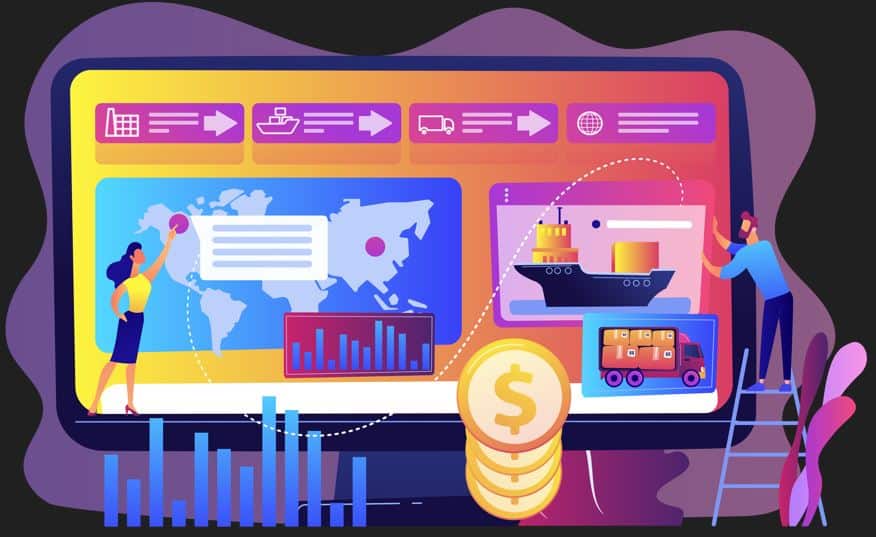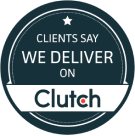Table of Contents
ToggleImagine if an app could capture a market share of just 1% of the global transport and logistics industry, which would be around $100 billion. Yes, you read it right. Even if it does a 0.01%, it would make around $1 billion. Such is the potential and profitability of the niche, with all the giant enterprises and small players together. The industry is set to make around $14.39 trillion in revenue by 2029 worldwide.
But wait, there isn’t a single subsector in this domain, like shipping, logistics, fleet management, delivery, and cargo. A few large enterprises cover multiple modes of transport and logistics, leaving little for new entrants. However, there are significant gaps in the sectors and service quality that anyone can fill with the right tools and strategy. Interested? Let’s explore the types of transport solutions, the merits of a comprehensive solution, and why choose a custom one.
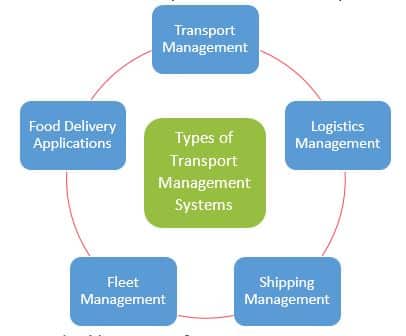
Types of Transportation Management Systems
With multiple categories and numerous subdomains, the transportation and logistics industry is a booming niche. Select the most beneficial one that suits your business model and strengths. In order to capture a fair market share, review the following major categories of this sector.
1. Transport Management Software
Transport Management Software (TMS) optimizes the planning, execution, and tracking of goods transportation to ensure efficient and cost-effective logistics operations. Its key features include route optimization, real-time tracking, freight billing, and scheduling automation. These features collectively help reduce operational costs, improve delivery accuracy, and enhance supply chain visibility. For instance, SAP Transportation Management supports global brands like Nestlé in streamlining their transportation across diverse markets.
2. Logistics Management Software
Logistics Management Software integrates and automates processes involved in moving goods from origin to destination, enhancing the efficiency of supply chains. It offers features like inventory tracking, warehouse management, order processing, and demand forecasting. Logistics software delivers significant value by minimizing delays, boosting operational efficiency, and optimizing overall logistics. Oracle Logistics Cloud, for example, empowers companies like FedEx to manage complex logistics networks with precision.
3. Shipping Management Software
Shipping Management Software simplifies the entire shipping process by handling orders, tracking shipments, and generating documentation. Features such as shipment tracking, label generation, carrier integration, and rate comparison ensure timely deliveries and transparent shipping processes. Shipping software enhances customer satisfaction. For instance, Shippo deals in shipping solutions for eCommerce brands like Etsy, integrating multiple carriers for efficiency.
4. Fleet Management System
Fleet Management Systems enable businesses to monitor, manage, and maintain their vehicle fleets effectively. They include features like GPS tracking, fuel management, vehicle diagnostics, and driver behavior analysis. A fleet management system helps reduce fuel costs, extends vehicle lifespan, and ensures compliance with safety standards. A notable example is Geotab, which aids companies like PepsiCo in optimizing fleet operations using advanced telematics and analytics.
5. Food Delivery Apps
Food Delivery Apps connect customers with restaurants, facilitating convenient online ordering and efficient delivery services. They comprise real-time order tracking, user-friendly interfaces, multiple payment options, and personalized recommendations, offering convenience to clients and higher reach for restaurants. Uber Eats collaborates with many brands like McDonald’s to deliver suave food ordering and delivery experiences globally.
Key Merits of a Comprehensive Transport Software
A comprehensive transport software optimizes logistics operations and route planning, providing businesses with higher efficiency, cost savings, and customer satisfaction. Here are its key merits:
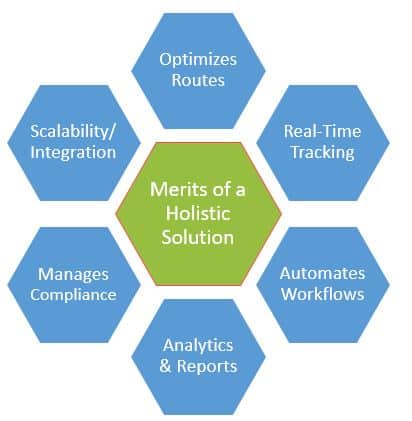
1.
Streamlines Route Optimization
Transport software uses advanced algorithms to analyze traffic, road conditions, and delivery schedules, determining the most efficient routes. It reduces fuel consumption, ensures timely deliveries, and contributes to significant cost savings while improving operational efficiency.
2. Real-Time Tracking and Visibility
With GPS integration, transport software offers real-time tracking of shipments and fleet movements. This transparency enhances reliability, allowing businesses to address disruptions and build stronger customer trust quickly.
3. Workflow and Task Automation
By automating tasks like scheduling, invoicing, and freight billing, transport software eliminates manual errors and saves time. Automation ensures smooth workflows and allows staff to focus on strategic decision-making rather than routine operations.
4. Data Analytics and Reporting
Transport software provides insightful analytics and reporting on fleet performance, fuel efficiency, and delivery timelines. These insights enable businesses to identify inefficiencies, forecast demand, and make informed decisions for continuous improvement.
5. Compliance Management
The software helps businesses adhere to industry regulations by tracking driver hours, vehicle maintenance schedules, and safety requirements. It ensures operational compliance and reduces potential legal risks, let alone saving substantial wear and tear costs.
6. Scalability and Integration
Transport software enhances operations scalability by accommodating growing business needs and integrating enterprise applications like warehouse management or ERP. In contrast, system integrations with internal, external, or third-party systems improve data sharing and processing.
Why is a Custom Software Better Than Standard Solutions?
Custom software is a bespoke solution that caters to specific business unique needs, making it a superior choice over standard software. Here’s why custom software is an ideal choice.
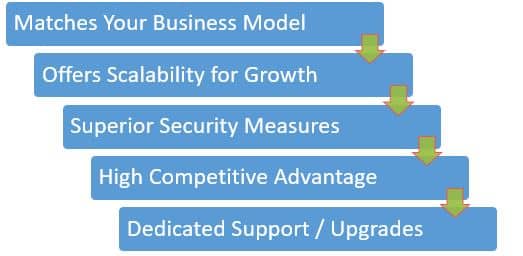
1. Matches Your Business Model
Custom software is built to align seamlessly with a business’s workflows and goals, ensuring smooth integration with existing systems. Unlike standard solutions, which come with generic features, they eliminate unnecessary functionality, streamlining processes for greater efficiency.
2. Scalability for Growth
Custom applications evolve with the business. As your operations grow, additional features can be added to meet increasing demands. Standard solutions often come with limitations on user capacity or require expensive upgrades, making custom software a more future-proof option.
3. Enhanced Security
Security is a major advantage of custom solutions. It is designed with advanced security measures tailored to the specific needs of the business, minimizing vulnerabilities. In contrast, widely used standard solutions are more susceptible to cyberattacks due to their mass-market nature.
4. Competitive Advantage
Custom software allows businesses to implement unique features that provide a competitive edge. Standard solutions often require companies to adapt their processes to fit the software, potentially sacrificing innovation and differentiation in the marketplace.
5. Dedicated Support
Custom solutions come with personalized assistance and regular updates from the development team. It ensures the software remains optimal and effective, while standard solutions may offer limited or generic support options. You may also modernize your custom apps for future visions.
Custom Transportation Software Development Company
Now that you’re thinking of hiring a custom transportation software development company let’s analyze our expertise. Unique Software Development has an absolute right to declare itself as a transportation and logistics software development company for many reasons. The following are a few of our success stories in this domain over a vast two-decade experience.
1. Mode Transportation
Vision
MODE Transportation sought to revolutionize trucking and transportation logistics by enhancing operational efficiency, refining pricing models, and leveraging business intelligence. The company emphasized delivering exceptional customer care, fostering stakeholder relationships, and streamlining complex logistics processes.
Features
Unique Software Development delivered a robust solution addressing critical pain points. Key features included container optimization, real-time quoting, and route optimization to enhance efficiency and cost savings. Additionally, the integration of business intelligence facilitated data-driven decision-making, while process automation reduced manual tasks, enabling seamless logistics management.
Impact
The comprehensive solution transformed MODE Transportation’s logistics, standardizing pricing strategies and ensuring precise delivery timelines. By incorporating insightful data fusion and predictive insights, the system empowered the company to navigate industry complexities effectively. This advancement not only optimized operations but also enhanced customer satisfaction and industry competitiveness.

2. Hub Group
Vision
Hub Group aimed to address inefficiencies in the freight and transportation industry by developing a centralized platform that unified discovery, selection, and tracking processes. The goal was to provide clients with a seamless experience for LTL, FTL, and final mile solutions while leveraging advanced technology.
Features
The Hub-Connect platform featured multimodal network management, live precise quotations, and granular freight analytics for streamlined decision-making. Other key functionalities included traffic and weather alerts, document consolidation, and shipment scheduling, ensuring efficiency and enhanced user experience.
Impact
The solution redefined logistics operations for Hub Group, facilitating scalable and agile logistics management. By integrating machine learning and real-time tracking, Hub-Connect improved delivery accuracy, route planning, and operational insights. The platform empowers Hub Group to offer premium services while driving revenue growth and fostering business development.
3. Yours Might Be the Next
Although we have a long list of success stories in our portfolio, we thought of including the best ones first. Yours might top the charts, getting into the top three positions while we ensure quality, value, and challenge resolution. Our professional software developers and weathered mobile app developers can combine your business idea with our methodologies.
The final product would be a unification of next-gen features, goal-driven strategies, and pleasant user experiences. Be it any specific subsector of the transportation and logistics industry or a holistic transport solution, it will be revolutionary. We add value at each step of the development process, embedding your business goals into the user journey with best practices.
Conclusion
The transportation and logistics industry is ripe for innovation. With custom software solutions, you can optimize operations, enhance customer experiences, and gain a competitive edge. From streamlining complex workflows to launching futuristic apps, the potential for impact is vast. The stories of Mode Transportation and Hub Group reflect the value we add to your digital assets.
Unique Software Development has a proven track record of delivering tailored software solutions for the transportation and logistics industry. Our expertise empowers businesses to achieve their goals, whether it’s optimizing existing operations or launching groundbreaking initiatives. Let’s partner up to elevate your business workflows and drive success for a superior impact.

